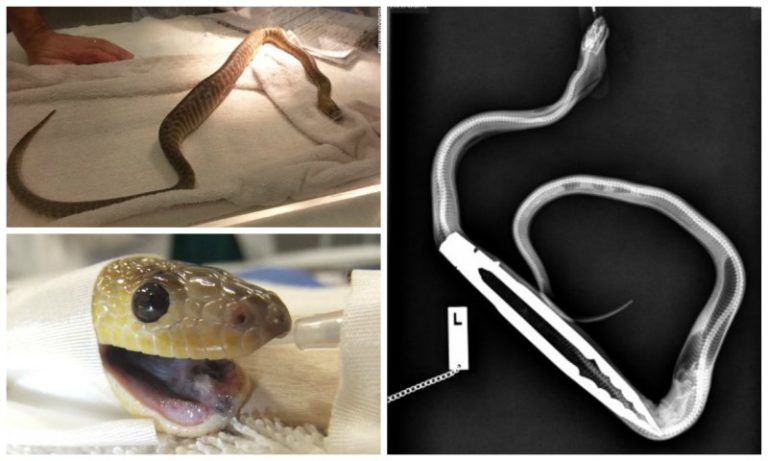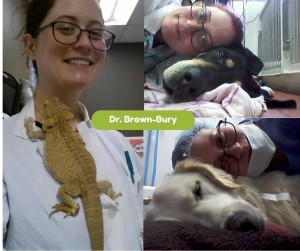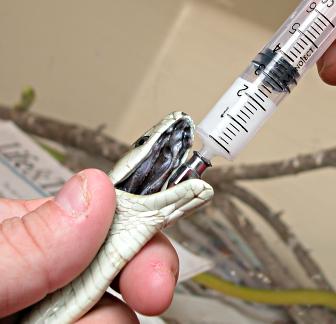This is the first in a series of occasional guest posts that we will feature on topics of interest written by veterinary and pet professionals – some are our clients, some are not. The only “requirement” is having something to say or share that would be of interest to readers who love animals. Every now and then we need to leave behind the difficult and emotional topic of paying for veterinary care, and just sit back, relax, and learn something new. And if we can laugh while we’re at it, so much the better!
Today’s post about snakes was written by Dr. Maggie Brown-Bury, a veterinarian at the AAHA-accredited St John’s Veterinary Hospital in St Johns, Newfoundland, Canada. I got to know “Dr. Maggie BB” through a veterinary social media & marketing forum in which we both participate. I was always captivated by her posts and comments, as she writes so well and has a terrific sense of humor. Plus, she posted a comment about treating a snake with a respiratory infection, and she mentioned that the snake sneezed! I was fascinated. And that is how her guest post came to be….
Readers can follow Dr. Maggie’s page on Facebook for interesting, informative information about pet health, delivered with compassion, sensitivity, and humor.

Dr. Maggie Brown-Bury with her dog, Princess Buttercup
“Snaaaaake!!! It’s a snaaake!!! Eeeeekkkk!!!”
by Dr. Maggie Brown-Bury
Many people are afraid of snakes, and do their best to avoid them. However, some people find them more fascinating than frightening, and for these people a snake may make an excellent pet. Like any pet, a snake is a long term commitment, so you need to do your research first.
There are many different kinds of snakes that people keep as pets, and they each have their own requirements in regards to what kind of environment you need to create for them, and what kind of food you need to offer them. Just like some breeds of dogs require more exercise than others, some snakes require more effort to maintain.
The size of the snake, as well as how active it likes to be, will determine the kind of habitat you’ll need. It’s not just the size of the habitat that matters, nor what you put in it, but also the temperature and humidity levels inside that habitat. You need to take into consideration when you are preparing for a pet snake how you will maintain your snake’s environment at a temperature that keeps the snake happy and healthy all year long, especially if you live somewhere with cold winters. We all learn in elementary school about “warm-blooded” animals versus “cold-blooded” animals – the cold-blooded animals are much more affected by the temperature of their surroundings, and require a certain environmental temperature to maintain their ideal body temperature. Inappropriate environmental temperatures can have a serious impact on a snake’s health.
A big sticking point for some people considering a snake as a pet, is feeding the snake. You won’t be finding a bag of “Snake Chow” at the pet store, snakes prefer much fresher food. Snakes like to eat “cute woodland creatures,” and the larger the snake, the larger the food. Your snake doesn’t care how cute the rabbit is, only that it is delicious and nutritious! Smaller snakes require smaller food items: rats, mice, and baby rodents are all common food items. If you’re okay with snakes but get a case of the willies at the idea of handling a mouse, you might have to think about how to get over your mouse-handling fears before you embark on snake ownership.
Once you know what kind of snake is best for you, and how to care for it, there is one last bit of research that is most often forgotten: what will you do if something goes wrong? Snakes aren’t for everyone, and plenty of people who are afraid of snakes go on to become veterinarians. These veterinarians will be of very limited use to you if your snake is ill! Some veterinarians specialize in “exotic” pets, which would be an ideal choice for health care of your snake. You know who to call if your house is on fire, or broken into, or if your loved one falls down the stairs – just so you should know who to call if your snake gets into trouble. There are plenty of areas where an exotics vet may not be available, and you do not want to be desperately calling every vet clinic in a 50km radius trying to find one who is willing to deal with a snake AFTER your snake has gotten into an accident. You want to have that phone number ready to go in case of emergencies.
What would be a cause for calling a vet? Similar to any pet, a decrease in appetite is a cause for concern and a reason to see your vet. A snake may stop eating if it has an infection in its mouth, or a respiratory infection. Another sign of a problem would include decrease in activity, or assuming unusual postures such as holding the head up high, and open-mouth breathing. Like any animal, a snake can sustain injury – burns are a common need for veterinary care, due to external heat sources in the habitat. Snakes shed their skin as a normal part of life, but sometimes they have difficulties with a shed and a good vet will be an excellent resource for dealing with this problem.

Snakes, like dogs, apparently eat things that they shouldn’t! A veterinarian had to surgically remove these metal tongs from the digestive tract of Winston the python. We assume Winston’s owner needed a payment plan for this! Click on the image to see the story about Winston’s ordeal, which he survived.
A snake can be a very rewarding pet – it’s uncommon, and requires a level of knowledge that sets you apart. If you are passionate about these unique animals, and dedicated to being a good snake owner, it can be an engrossing lifelong hobby while you help educate the people in your life about respecting, not fearing, these impressive creatures. There’s nothing like watching someone touch a snake for the first time – so many people think them “gross” and “slimey”, and are amazed when they get to experience the truth!!
Dr. Maggie Brown-Bury graduated from the Ontario Veterinary College in 2009, and started working at St John’s Veterinary Hospital in St John’s Newfoundland (Canada) as soon as she finished school. At St John’s she sees all manner of pets: cats, dogs, rabbits, guinea pigs, and — of course — snakes and lizards. She has a passion for client education and communication.
Of Dr. Maggie her clinic writes: “If you’ve ever called our clinic and asked “Will you guys see my [insert any animal]?”, chances are the receptionist went and asked Dr. BB and she said yes. She enjoys interacting with all kinds of critters, and as long as she can find one person to help her out (and a ready and willing owner will do!) she will tackle most any problem – such as the abscess on the foot of this bearded dragon, Drago.”

Dr. Maggie at work, with (clockwise from left): Drago the bearded dragon; her own dog, Ollie; and Hank the Golden Retriever
[Please note: Neither Dr. Maggie Brown-Bury or St Johns Veterinary Hospital are affiliated with VetBilling.com in any way. The original post written for us by Dr. Brown-Bury is not an endorsement of the services provided by our company. Her blog post represents our commitment to providing our community with quality, original content that focuses on a variety of animal-related topics.]
The mission of VetBilling.com is to reduce the frequency of economic euthanasia and shelter surrender, and to improve financial access to veterinary services, by providing veterinary clinics with more flexible payment options to offer their clients.
VetBilling.com allows veterinarians to set up in-house, contract-based installment payment plans. VetBilling.com automatically drafts the pet owner’s checking, savings or credit/debit card account, and then transfers those payments to the veterinary practice’s bank account. Payments are completely managed by VetBilling.com, and include intervention in, and resolution of, any problematic transactions.
Our services are available at no cost to the veterinary practice* (see below.) Pet owners pay a nominal one-time enrollment fee, and a small convenience fee is added to each recurring payment. There are no other charges or fees associated with the plans.
